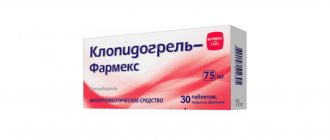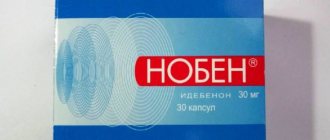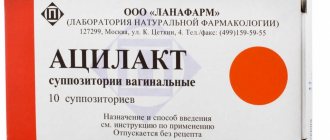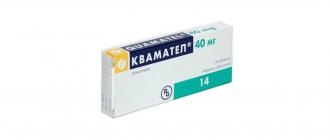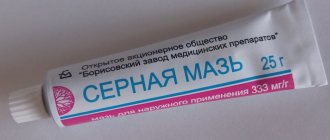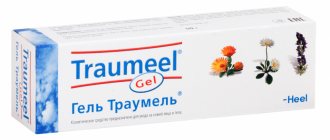Pharmacodynamics and pharmacokinetics
The effect of the drug on the body is due to the combination of two active ingredients bendazole and papaverine . Papaverine reduces vascular resistance and blood pressure due to the fact that it blocks the enzyme phosphodiesterase and creatine phosphokinase in blood vessels. The amount of calcium inside the cell decreases, cyclic AMP , this causes the vasodilator effect of the drug. Papaverine has an antispasmodic effect on the gastrointestinal tract and bile - and urinary tract.
Bendazole directly affects imidazole receptors of vascular smooth muscles (their walls). Thus, like papaverine, it relieves spasms, lowers blood pressure, and reduces the amount of calcium inside the cell. The substance also stimulates the activity of the spinal cord and, when taken for a long time, acts as an immunomodulator . The processes of protein and nucleic acid , antibody and phagocytosis .
What is the medicine used for and for what?
The drug has a vasodilator, antispasmodic, and vasodilator effect . In large doses it has a mild sedative effect .
Does the drug increase or decrease blood pressure?
Papazole reduces blood pressure by reducing the resistance of the vascular walls.
"Papazol": description and characteristics
The product is produced in the form of tablets, which contain 2 active ingredients: papaverine in the form of hydrochloride and bendazole (each weighing 0.3 g per tablet). The composition also contains auxiliary components - starch, talc and stearic acid.
Packaging – plastic jar or cardboard box, each containing from 10 to 60 pcs. The product can be purchased at any pharmacy without a prescription. Should be stored in a dark place at room temperature (no more than 30 degrees) within the total shelf life of 5 years from the date of production.
The drug is an antispasmodic; the active components dilate blood vessels, making it possible to stabilize (lower) blood pressure. Thus, papaverine reduces the physical resistance of the inner surface of blood vessels and neutralizes the action of the phosphodiesterase enzyme. The intracellular calcium concentration decreases, which leads to the accumulation of AMP.
This promotes a vasodilator effect, i.e. dilation of blood vessels, increasing their volume. Papaverine also leads to the elimination of spasms in the biliary tract, ureters, and ECT organs, which leads to a weakening or complete relief of pain.
Bendazole affects specific smooth muscle receptors lining the walls of blood vessels. It also eliminates spasms, which leads to lower blood pressure and a decrease in calcium concentration in cells.
Bendazole acts on the spinal cord, stimulating its work. If you take the drug for a long period, the immunomodulatory effect will be noticeable - strengthening the immune system, synthesis of antibodies, destruction of infectious agents.
Thus, “Papazol” has a complex effect on the body:
- decreased blood pressure (vasodilator effect);
- strengthening the immune system;
- vasodilation;
- preventing spasms;
- weak sedative effect (if taken in large doses).
Contraindications
- drug allergy;
- respiratory depression and epilepsy ;
- children under one year old;
- AV conduction disorder;
- liver and kidney diseases;
- hypothyroidism and head injury;
- decreased intestinal motility , some diseases of the prostate gland .
The medicine is prescribed with caution for traumatic brain injury and for pregnant and lactating mothers.
What is Papazol used for: indications
Tablets should be taken in consultation with your doctor. They are usually prescribed for the treatment of the following pathologies:
- periodic increases in blood pressure (labile arterial hypertension);
- spasms of the stomach, intestines, and other gastrointestinal organs;
- spasms of large vessels (including arteries);
- spasms of cerebral vessels;
- treatment of residual consequences of polio.
Interaction
Combination with adsorbents, astringents and drugs that coat the gastrointestinal tract .
The effect of the medicine will be enhanced when combined with sedatives , tricyclic antidepressants , antispasmodics , novocainamide , diuretics , reserpine .
The drug weakens anticholinesterase drugs , levodopa , proserin .
The toxic effect on the liver when used with nitrofurantoin is enhanced.
Contraindications and side effects
In some cases, taking the drug is limited or completely eliminated:
- children during the first year of life;
- chronic kidney disease;
- liver pathologies;
- hypothyroidism;
- significant deterioration of intestinal motility;
- epilepsy;
- depression of the respiratory system;
- certain pathologies of the representative gland;
- individual intolerance, manifestation of allergic reactions.
During pregnancy and breastfeeding, the drug is taken with caution and only in consultation with a doctor. Clinical studies on the effect of Papazol on the development of the fetus and child have been conducted in insufficient quantities, so there is no clear data. Moreover, judging by the reviews of many women, taking the drug during pregnancy is safe.
If the patient has previously suffered a traumatic brain injury, he should also take the drug only after the doctor's permission. Side effects are rare, but not excluded. In some cases, patients complain of pain in the heart area, constipation, nausea, and increased sweating. Itching, redness and other allergic reactions are also possible.
Analogs
Level 4 ATX code matches:
Tornetis
Olmax Strong
Taxier
Dynamico
Revatio
Caverject
Levitra
Cialis
Tentex Forte
Rileys
Viagra
Sildenafil
Yohimbine hydrochloride
Zidena
Dibazol, duzopharm, enelbin 100 retard, papazol-lhfz, vinoxim MV, papazol-darnitsa.
Papazole Renewal
Contraindications:
Hypersensitivity to the components of the drug, atrioventricular conduction disorders, respiratory depression, epileptic syndrome, broncho-obstructive syndrome, children under 3 years of age.
Side effect:
For Papazole
To date, no side effects have been reported with this combination. The incidence of the following possible side effects is unknown.
- From the central nervous system: dizziness, drowsiness.
- From the cardiovascular system: development of atrioventricular block, cardiac arrhythmia, decreased myocardial contractility.
- From the digestive system: nausea, vomiting, constipation.
- From the skin: increased sweating.
- Other: allergic reactions.
For Bendazole
The listed effects appear when used in large doses. When the dose is reduced or the drug is discontinued, these side effects quickly disappear.
- From the central nervous system: frequency unknown - dizziness, headache.
- From the skin: frequency unknown - increased sweating.
- From the digestive system: frequency unknown - nausea.
- For Papaverine hydrochloride
- From the central nervous system: often – drowsiness.
- From the skin: often - skin rash (usually erythematous, urticaria), infrequently - itching, rarely - increased sweating.
- From the digestive system: often – nausea, constipation, infrequently – increased activity of “liver” transaminases.
- From the cardiovascular system: often - decreased blood pressure, infrequently - ventricular extrasystole.
- From the hematopoietic organs: very rarely - eosinophilia.
Laboratory indicators:
Overdose:
For Papazole: the symptoms of a drug overdose are caused by the properties of its constituent components. In case of an overdose, a feeling of heat, increased sweating, diplopia, weakness, drowsiness, nausea, dizziness, hypotension, headache occurs.
For Bendazole: there are no data on cases of overdose. The most likely adverse event would be a marked decrease in blood pressure.
For Papaverine hydrochloride: symptoms of overdose - diplopia (double vision), weakness, decreased blood pressure.
Interaction with other drugs:
Pharmacodynamic: when used simultaneously with antispasmodics, sedatives, diuretics, tricyclic antidepressants, procainamide, reserpine, quinidine, the hypotensive effect may be enhanced.
Weakens the effect of anticholinesterase drugs (galantamine, proserine, physiostigmine and others) on smooth muscles; reduces the antiparkinsonian effect of levodopa.
Pharmacokinetic: adsorbents, astringents and enveloping agents reduce the absorption of the drug in the gastrointestinal tract.
Bendazole: prevents the increase in total peripheral vascular resistance caused by beta-blockers. Phentolamine enhances the hypotensive effect of bendazole.
Papaverine hydrochloride: reduces the antiparkinsonian effect of levodopa and the hypotensive effect of methyldopa. In combination with barbiturates, the antispasmodic effect of papaverine is enhanced. When used together with tricyclic antidepressants, procainamide, reserpine, quinidine, the hypotensive effect of papaverine may be enhanced. In combination with alprostadil, the risk of developing priapism increases.
Papazole price (where to buy)
The average price of Papazole and Papazole UBF for 10 tablets (1 tablet of the drug) ranges from 7 to 12 rubles.
- Online pharmacies in RussiaRussia
- Online pharmacies in UkraineUkraine
- Online pharmacies in KazakhstanKazakhstan
ZdravCity
- Papazol tab.
10 pcs Pharmstandard-Tomskkhimpharm OJSC 16 RUR order - Papazol tablets 20 pcs. Pharmstandard-Leksredstva OJSC
68 RUR order
- Papazol reneval tab. 0.03yy+0.03yy 20pcs JSC PFK Update
86 rub. order
Pharmacy Dialogue
- Papazol (tab. No. 10) FS.-Tomskkhimpharm
13 rub. order
- Papazol (tab. No. 20) FS.-Leksredstva
76 RUR order
- Papazol (tab. No. 10) DHF JSC
21 rub. order
- Papazole Renewal (tab.30mg+30mg No. 20)Update of PFC CJSC
80 rub. order
show more
Pharmacy24
- Papazol-Darnitsa No. 10 tablets PrAT" Pharmaceutical company "Darnitsa", Ukraine
10 UAH. order
PaniPharmacy
- Papazol tablets Papazol tablets. No. 10 Ukraine, Darnitsa ChAO
11 UAH order
show more
Drug interactions
When taking Papazol together with other drugs, the following effects are possible:
- weakening of the effect of adsorbents, enveloping and astringent drugs;
- enhancing the effect of Papazol in combination with antispasmodics, diuretic drugs, tricyclic antidepressants, as well as sedatives;
- weakening of drugs of the anticholinesterase group, Levodopa, Proserin;
- increased toxic effects on the liver when taken together with the drug "Nitrofurantoin".
